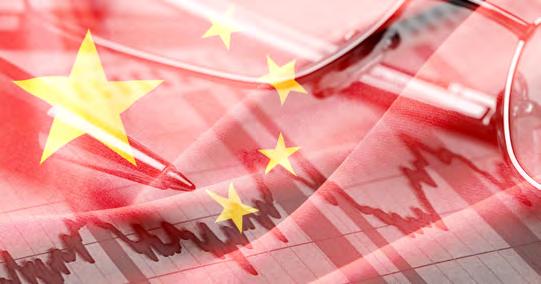
1 minute read
China’s new 5% growth target underwhelms as its focus shifts to boosting consumption
Mining stocks fall back on implications for commodities demand
New Chinese guidance for GDP (gross domestic product) growth has checked some of the optimism over any boost from the country’s reopening and hit shares in resources stocks given the implications for commodities demand.
China’s GDP growth of 3% for 2022 was the lowest since 1976 as it struggled with lockdowns and weakening demand for exports.
Many economists were expecting a strong rebound in 2023 as the economy emerges from its restrictive zero-Covid policy.
It therefore comes as quite a shock to see the new growth target announced at the National People’s Congress set at just 5% which is at the bottom end of market expectations according to a Reuters report.
While the initial stages of China’s growth in the late 20th and early 21st centuries were focused on building infrastructure and new cities to pull people out of rural areas the hope is that future growth will be driven by increased consumption.
China’s latest efforts to spur consumption are intended to bring its economy in line with most western economies where consumer spending makes up around two thirds of GDP.
Outgoing Chinese premier Li Keqiang said: ‘The incomes of urban and rural residents should be boosted through multiple channels. We should stabilise spending on big-ticket items and promote recovery in consumption of consumer services.’
The budget deficit as a percentage of GDP was increased from 2.8% in 2022 to 3%. Former Shanghai party chief Li Qiang, an ally of president Xi Jinping, is expected to be confirmed as the new premier imminently.
Other reform-oriented policy officials are set to retire, allowing more Xi loyalists to take the reins and strengthening his grip on power after winning a third term at October’s Communist Party Congress.
Long-time emerging markets investor Mark Mobius, previously bullish on China, told Fox Business on 2 March the Chinese government has restricted the flow of money out of the country, leaving him unable to get his own cash out, and warned investors of barriers being imposed. Claims which have been denied by Beijing.
In a worrying sign of increasing geopolitical tensions, in particular over Taiwan, the military budget was increased from 7.1% to 7.2% of GDP with the armed forces urged to devote more energy towards combat preparedness.
One of the many challenges facing the economy is demographics with the population shrinking for the first time in 2022 since the 1960s. Chinese officials said it plans to tackle falling fertility by reducing the costs of childbirth and education. [MG]










